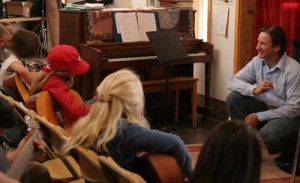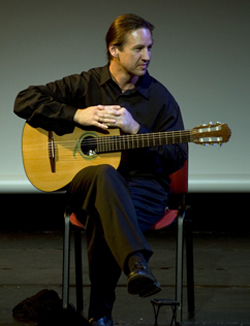Lead Guitar Brings Music Back to Tucson Classrooms

Brad Richter teaching at the Aspen Music Festival.
photo: Deborah Barnekow/courtesy Brad Richter
It’s no secret that children who study music at a young age receive significant advantages that help them excel in the classroom and in life thanks to the cerebral gifts music education provides. Studies have proven that kids who are taught music have larger vocabularies, enhanced problem solving skills, boosted critical thinking, are better at math, English and science, have less of a chance of falling into drugs and alcohol abuse, have higher graduation rates and achieve better social development, among many other things.
The problem with severe government budget cuts to schools over the past decade is the arts and music departments seem to be the first to go, leaving music programs near extinction for this generation. Luckily, one group is taking a stand in Southern Arizona to bring music back to the classrooms. Thanks to Brad Richter and his non-profit program Lead Guitar, Tucson’s children are getting a chance to reap the abounding benefits of music education.
“What we do is provide guitar programs for public schools with a focus on districts that have a lot of at-risk kids from areas of disadvantaged neighborhoods,” says Richter. “We are the worst state in the nation as far as per capita spending on public schools. The principals and teachers that we work with really believe in the arts and its ability to enhance the lives of the students and help them in their other subjects, but their hands are tied due to constant budget cuts. Part of our mission is to sneak arts back into the school through the back door.”
Richter’s curriculum includes the principles of classical guitar technique, fundamentals of reading music and notation, performing ensemble music, following a conductor and working as a team, to name just a few. And to help Richter’s mission of bringing music back into Tucson’s classrooms, Lead Guitar recently merged with UApresents in an effort to reinforce the program. Richter now holds the title of director of arts education where he will train teachers on how to execute the four-year progressive curriculum that is currently being carried out in classrooms for more than 10,000 students.

Brad Richter on stage at the World Youth Guitar Festival in England. Photo: Joe P. Smith
“Teaming with UApresents does a lot of great things for this program and is really helping to expand it. It gets our students onto the university campus over and over again,” says Richter. “We have a program called Lead Guitar All Stars that meet every Monday night, and they meet at the university and they go to all of the concerts for free and can take master classes at the university. A lot of kids in our program don’t have parents who have attended a university, so it’s a way to let them know that they’re welcomed and encouraged there.”
The results of the program have been astounding for the participating students, some of which have already gone on to accomplish amazing things post-high school. One example is 20-year-old Jose Espinoza who was a freshman at Amphitheatre High School in 2008. His grades were poor and he often skipped class until he entered the Lead Guitar program where he excelled at classical guitar. His grades immediately improved and as he neared graduation he received scholarship offers (including the Presidential Scholarship to Boston’s renowned Berklee College of Music) for his skill at performance. He now plans to attend college to pursue a career in music therapy.
“Lead Guitar instilled in me the discipline of studying and practicing in order to get better at something. I started to figure out that if I applied myself to other things like I was applying myself to music that I would see the same effects,” says Espinoza. “I was never good at reading textbooks or studying, but after having to read pages and pages of music and memorizing and reacting to it, it started making my classes seem easy. Becoming a better musician, by following the disciplined classical guitar approach, made me realize that I could do a lot of things after high school and then doors started opening up for me.”
Richter himself found music as a calling at a young age when he taught himself how to play guitar as a boy and began to see how powerful of an influence it had on his life. He started to take his studies seriously, which led him to receive the Presidential Scholarship to the American Conservatory of Music in Chicago. From there he was granted a scholarship to the Royal College of Music in London where he became the first guitarist in the college’s history to receive the Thomas Morherr Prize. He toured the world gaining high acclaim for his talents as a master guitarist and decided to make Tucson his home in 1997.
“I was a bright enough kid, but I was really unmotivated in school and was a bad student. I loved music at a young age but I didn’t have access to any guitar teachers or classes, so I taught myself the guitar. Something about studying guitar so intensely spread into the rest of my academic life. I could feel my brain changing,” says Richter. “I could remember numbers and formulas better, I could add and subtract better. Because I was spending so much time memorizing music, my memory was also better and sharper. There were many tangible changes in my life that only came from learning music and it is my goal now to spread that to the next generation.”
For more information on Lead Guitar’s programs, and how to support it, visit LeadGuitar.org and follow them on Facebook by searching “Lead Guitar.”




